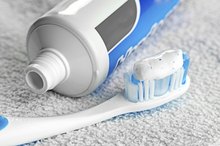Does Splenda Aggravate the Kidneys?
If you are concerned about your sugar intake, you may find yourself reaching for an artificial sweetener such as Splenda. A product of McNeil Nutritionals, L.L.C., Splenda is a leading competitor in a chemically engineered market of sweeteners that includes saccharine and aspartame. There is increased speculation that Splenda may aggravate the kidneys and introduce toxins to other parts of the body. Scientific studies, however, have yet to demonstrate any toxic effects as of publication.
What is Splenda?
Although Splenda is an artificial sweetener, its origin is natural 3. Splenda is sucralose, a chlorocarbon made from sucrose, or table sugar, that is crystalline in nature and water-soluble 1. During manufacturing, the sucrose undergoes a chemical reaction that forms chlorine and carbon atoms that bond together to form chlorocarbon molecules. Although Splenda has a natural base, the chemical process results in an artificial chemical compound, which according to a report from Elmhurst College, is approximately 600 times sweeter than natural sugar 1.
The Controversy
Stevia & the Atkins Diet
Learn More
The chemical composition of Splenda and its effect on the human body is a matter of controversy. Animal testing and the results lead some to believe that the artificial sweetener is a health hazard, specifically to the kidneys. According to the U.S. Food and Drug Administration, Department of Health and Human Services, sucralose testing in rat pups showed evidence of a kidney weight increase, but not enough to render the outcome toxic 2. Tests in adult females produced signs of excess calcium in the kidneys, or nephrocalcinosis, but because rats are prone to calcification, such findings are irrelevant and not a matter of concern for humans.
- The chemical composition of Splenda and its effect on the human body is a matter of controversy.
- According to the U.S. Food and Drug Administration, Department of Health and Human Services, sucralose testing in rat pups showed evidence of a kidney weight increase, but not enough to render the outcome toxic 2.
FDA Approved
Despite the controversy surrounding Splenda, the U.S. Food and Drug Administration has provided Splenda with its seal of approval. The approval followed the reviews of approximately 100 studies, which revealed no link between sucralose and health risks. According to the National Cancer Institute Fact Sheet, Splenda received approval as a tabletop sweetener in 1998 3. In 1999, the FDA approved Splenda as an all-purpose sweetener.
- Despite the controversy surrounding Splenda, the U.S. Food and Drug Administration has provided Splenda with its seal of approval.
- According to the National Cancer Institute Fact Sheet, Splenda received approval as a tabletop sweetener in 1998 3.
The Bottom Line
Side Effects of Sodium Cyclamate
Learn More
Since it is FDA-approved, the use of Splenda as sweetener is a personal choice. In light of its chlorine content of Splenda and the fear of metabolic toxicity resulting in kidney disease and cancer, there is an outcry from certain advocate groups that further testing is necessary. According to the University of California research website, eScholarship, long-term human studies are limited -- most lasting no longer than 13 weeks. Although Splenda is deemed safe for human consumption, the FDA suggests introducing Splenda to your body cautiously and seeking medical intervention if any unpleasant side effects result.
- Since it is FDA-approved, the use of Splenda as sweetener is a personal choice.
- Although Splenda is deemed safe for human consumption, the FDA suggests introducing Splenda to your body cautiously and seeking medical intervention if any unpleasant side effects result.
Related Articles
References
- Elmhurst College: Sucralose or Splenda
- Food and Drug Administration, Department of Health and Human Services: Food Additives Permitted for Direct Addition to Food for Human Consumption; Sucralose
- National Cancer Institute Fact Sheet: Artificial Sweeteners and Cancer
- University of California: Splenda - A Safe and Sweet Alternative to Sugar
- Liauchonak I, Qorri B, Dawoud F, et al. Non-nutritive sweeteners and their implications on the development of metabolic syndrome. Nutrients. 2019;11(3) doi:10.3390/nu11030644
- Yang Q. Gain Artificial sweeteners and the neurobiology of sugar cravings: Neuroscience 2010. Yale J Biol Med. 2010;83(2):101-8.
- Grotz, V Lee, et al. Lack of effect of sucralose on glucose homeostasis in subjects with type 2 diabete (T2DM). J Amer Dietetic Assoc. 103(12):1607-12. doi:10.1016/j.jada.2003.09.021
- Sylvetsky AC, Rother KI. Nonnutritive Sweeteners in Weight Management and Chronic Disease: A Review. Obesity. 2018;26(4):635-640 doi:10.1002/oby.22139
- Miller PE, Perez V: Low-calorie sweeteners and body weight and composition: a meta-analysis of randomized controlled trials and prospective cohort studies. American Journal of Clinical Nutrition. 2014.
- Antenucci RG, Hayes JE. Nonnutritive sweeteners are not supernormal stimuli. Int J Obes, 2014. doi:10.1038/ijo.2014.109
- American Diabetes Association. Standards of Medical Care in Diabetes - 2018. Diabetes Care. 2018;41(Suppl 1):S1-S159. http://care.diabetesjournals.org/content/41/Supplement_1
- Berry C, Brusick D, Cohen SM, et al. Sucralose non-carcinogenicity: A review of the scientific and regulatory rationale. Nutrition and Cancer. 2016. 68(8):1247-1261. doi:10.1080/01635581.2016.1224366
- Jing Ma, et al. Effect of the artificial sweetener, sucralose, on gastric emptying and incretin hormone release in healthy subjects. Am J of Physiol Gastrointest Liver Physiol. 2009; 296(4): G735-739. doi:10.1152/ajpgi.90708.2008
- Peters JC, Wyatt HR, Foster GD, et al. The effects of water and non-nutritive sweetened beverages on weight loss during a 12-week weight loss treatment program. Obesity Journal. 2014;22(6):1415-21. doi:10.1002/oby.20737
- Shwide-Slavin C, Swift C, Ross T. Nonnutritive sweeteners: Where are we today? Diabetes Spectrum. 2012 May;25(2):104-110. doi:10.2337/diaspect.25.2.104
Resources
Writer Bio
Jonae Fredericks started writing in 2007. She also has a background as a licensed cosmetologist and certified skin-care specialist. Jonae Fredericks is a certified paraeducator, presently working in the public education system.









